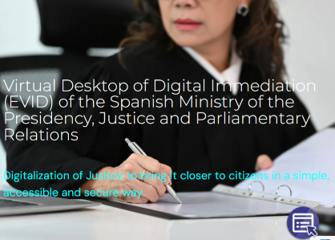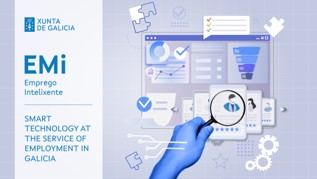
The Public Sector Tech Watch (PSTW) observatory launched in 2024 the ‘Best Cases Award’. The aim was to spotlight solutions using emerging technologies (Artificial Intelligence, Blockchain, etc.) in public administrations at all levels to enhance public services for citizens (G2C) or to improve their internal processes (G2G). On the one hand, the award aimed to generate a virtuous mechanism for sharing the best experiences on the use of emerging technologies in the public sector; and on the other, to give visibility to the most innovative public administrations in Europe.
The deadline for submissions was the 30th of August 2024. A big thank you to all submitters! Thirty-two cases were received to run for the 2024 Award: out of those, fourteen cases were shortlisted in a prior evaluation. The Evaluation Committee announced the final winners during the Grand Finale at the GovTech Connect Assembly on 28 November 2024. Here below you find out more about the winners and special mentions of the 2024 BCA edition.
Government-to-Government (G2G) Award
The G2G (government-to-government) award category highlights notable solutions envisioned for/implemented in the public sector that use emerging technologies to improve their internal processes. To see all the submitted cases, go to the section below "All submitted cases".
Recognised for leveraging technological innovativeness to increase government openness with participatory urban planning.
Reimagining Helsinki: Participatory urban planning with Generative AI
- Submitter organisation: City of Helsinki
- Technology and status: Artificial Intelligence. Implemented
- Responsible Public Sector Organisation: City of Helsinki (Local)
- Geographical coverage and extent: Finland. Local
- Description: Helsinki is integrating advanced AI technologies into urban planning. The solution, UrbanistAI features AI-powered co-design tools allowing participants to create realistic images of potential street transformations so they could be discussed and evaluated. This approach uses the universal language of imagery and it is highly inclusive, involving individuals of all demographics. Together, they successfully co-designed two streets that were later constructed.
Government-to-Citizen (G2C) Award
The G2C (government-to-citizen) award category highlights notable solutions envisioned for/implemented in the public sector that use emerging technologies to enhance public services for citizens (G2C). To see all the submitted cases, go to the section below "All submitted cases".
Recognised for using blockchain technology to speed up and make judicial processes more accessible.
Virtual Desktop of Digital Immediation: Bringing Justice closer to citizens through digitalisation
- Submitter organisation: Councilbox
- Technology and status: Blockchain. Implemented
- Responsible Public Sector Organisation: Spanish Ministry of the Presidency, Justice and Parliamentary Relations (Central)
- Geographical coverage and extent: Spain. National
- Description: This solutions aims to bring Justice closer to citizens through digitalisation, to make it more inclusive, accessible and green, facilitating the holding of remote hearings with full legal security guarantees. By using Blockchain, the veracity of all events that occur between the beginning and the end of each process carried out in the Virtual Digital Immediation Desk (EVID) is guaranteed. At the end of June 2024, more than 370,000 virtual meetings having been held through the EVID.
Government-to-Government (G2G) honorable mention
Recognised for its efficient and effective use of AI to streamline public service operations.
AI to streamline the sorting of certified emails (CEs)
- Submitter organisation: Italian Social Security and Welfare Administration (INPS)
- Technology and status: Artificial Intelligence. Implemented
- Responsible Public Sector Organisation: Italian Social Security and Welfare Administration (INPS) (National)
- Geographical coverage and extent: Italy. National
- Description: INPS uses an open-source machine learning model that analyses all CEs and their attachments, accurately classifies them into the relevant topics and directs them to the designated personnel, effectively eliminating the need for manual processing. Over two million emails have been successfully classified since its deployment.
Government-to-Citizen (G2C) honorable mention
Recognised for using AI in an innovative way targeted towards benefitting citizens.
EMi Emprego Intelixente (EMi Smart Employment)
- Submitter organisation: Consellería de Emprego, Comercio e Emigración. Xunta de Galicia
- Technology and status: Artificial Intelligence. Implemented
- Responsible Public Sector Organisation: Consellería de Emprego, Comercio e Emigración. Xunta de Galicia (Regional)
- Geographical coverage and extent: Spain. Regional
- Description: Emi (Smart employment) is an artificial intelligence and big data tool that helps the Galician Public Employment Service ’s offices to guide unemployed people towards the skills that the labour market requires, based on their abilities. The AI models make 6-month projections of contracts for a specific occupation for a chosen geographical area. In addition, they can calculate the probability of finding employment for individuals in 3, 6 and 12 months.
Holistic digital innovation honorable mention
Recognised for carrying out a structured and comprehensive digitisation of the entire administration.
Robotic Process Automation in the Administration of Justice
- Submitter organisation: Ministerio de la Presidencia, Justicia y Relaciones con las Cortes
- Technology and status: Artificial Intelligence. Implemented
- Responsible Public Sector Organisation: Ministerio de la Presidencia, Justicia y Relaciones con las Cortes (Central)
- Geographical coverage and extent: Spain. National
- Description: The application of Robotic Process Automation to routine, repetitive and low-risk work, allows to streamline the work of the processing staff and to help citizens and professionals. To date, more than 25 lines of process automation have been launched, including automatic cancellation of criminal records, nationality applications, automatic issuance of life insurance certifications, etc., and it is estimated to have saved more than 500 thousand hours of work for civil servants.
BC4IOP (Blockchain for Interoperability) honorable mention
Recognised for the deployment of blockchain to make cross-border transport seamless and secure by improving interoperability.
eFTI4EU: making the future of freight transport digital
- Submitter organisation: Estonian Ministry of Climate
- Technology and status: Blockchain. In development
- Responsible Public Sector Organisation: Estonian Ministry of Climate as project coordinator (Central)
- Geographical coverage and extent: European Union
- Description: the eFTI4EU project aims to create a robust framework for the digital transformation of freight transport across Europe, and it is the first project making the EU Regulation 2020/1056 (eFTI) real. The project aims to implement a reference architecture for exchanging logistics and transport data, which will be piloted through a series of use cases (both at national and cross-border level) in all the 9 Member States directly involved.







